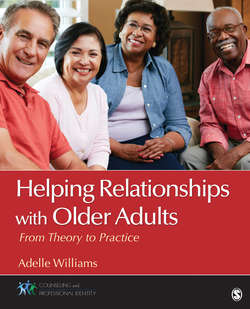Читать книгу Helping Relationships With Older Adults - Adelle M. Williams - Страница 85
На сайте Литреса книга снята с продажи.
Remaining Flexible and Open
ОглавлениеStereotypes, myths, and erroneous information regarding aging and the abilities of older adults is pervasive within the American culture. Henderson, Xiao, Siegloff, Kelton, and Peterson (2008) found that first year nursing students’ attitudes toward aging tended to be positive; however, the students did not aspire to work with geriatric patients. The reasons for not wanting to work with older adults were difficulty in relating or communicating with older people, feelings of the work being boring, and inexperience in caring for older people. However, students who had previously worked with elderly patients reported more positive attitudes, suggesting that positive exposure to such persons diminished negative feelings about aging.
Similarly, social work students’ negative attitudes toward older adults regarding their productivity, adaptation, independence, and optimism were a result of little previous contact with elderly individuals and minimal knowledge about aging prior to graduate school (Gellis, Sherman, & Lawrence, 2003). While Gellis and colleagues (2003) did not find experiences to predict attitudes toward older people among nursing, gerontology, and health science students, attitudes toward elderly adults changed as a result of ongoing exposure to and meaningful intergenerational exchanges with such persons (Butler & Baghi, 2008).
Older clients are capable of personal growth in the latter stage of life, unless there exists diseases that negatively impact their cognitions. While an individual’s basic personality is usually formed by around age 30, personality traits of older men and women take on a different pattern. For example, in later life, women may become more assertive and aggressive (when needed), and older men may become more nurturing. Therefore, the idea of being inflexible and rigid is questionable, at best. Both the older client and helping professional need to maintain openness to what can be accomplished within the therapeutic encounter.
Counselors help people with issues of career and sexual development well before they are fully active in these areas. Similarly, work to promote successful aging must begin before old age. Successful aging can involve adjusting to life transitions (such as from work to retirement), which can be thought of as turning points that occur between periods of stability within one’s life (Goodman, Schlossberg, & Anderson, 2006). Transitions often require a person to journey into the unknown, take risks, adapt, and cope with fears. They can therefore be challenging times in one’s life, often experienced as a crisis. Transitions can also create opportunities for personal discovery, renewal, and transcendence to heightened levels of existence.
